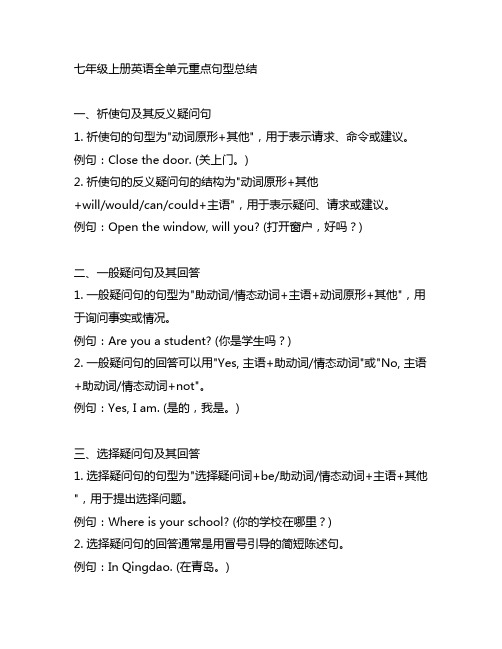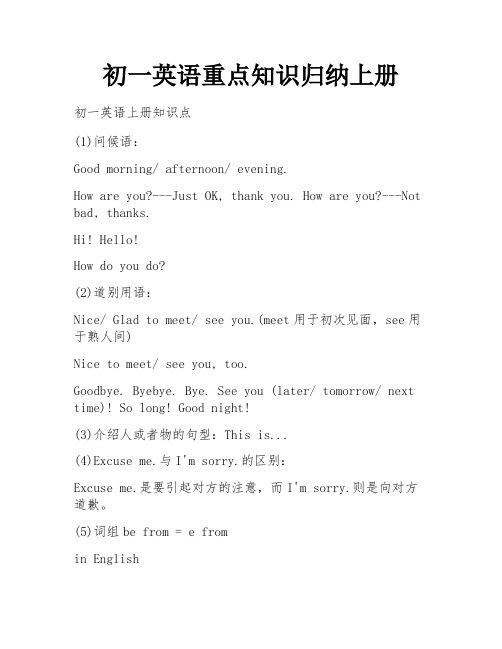七年级上册英语重点句子总结
[全]七年级英语上册第一单元知识点考点语法总结人教
![[全]七年级英语上册第一单元知识点考点语法总结人教](https://img.taocdn.com/s3/m/670194873c1ec5da50e270d8.png)
七年级英语上册第一单元知识点考点语法总结一.短语归纳:Your name 你的名字first name 名字last name 姓氏her name 她的名字telephone /phone number 电话号码in China 在中国二.必背典句:1.—nice to meet you!见到你很高兴!—Nice to meet you,too.见到你我也很高兴。
2.—What’s your name?你的名字是什么?—Alan.艾伦3.I’m Jenny我是珍妮。
4. What’s his / her name?他的/她的名字是什么?5. Her name’s Mary.她的名字是玛丽。
6. What’s your first/last name?你的名字/姓氏是什么?7.—What’s his telephone number?他的电话号码是多少?—It’s 876-9548 是876-9548.三.形容词性物主代词物主代词是表示所有关系的代词,是人称代词的属格形式。
它分第一人称、第二人称和第三人称,每个人称又分单数和复数。
物主代词分形容词性物主代词和名词性物主代词。
形容词性物主代词的用法和形容词的用法相似,具有形容词的性质。
在句中作定语,修饰名词,一般放在被修饰的名词前,不能单独使用。
如果名词前还有其他的定语,物主代词要放在其他定语的前面。
(2011年重庆中考题)Pleasesend best wishes to Mary.A. IB. meC. myD. mine(2011年河北) George reads the newspaper every morning . That’s habit.A. heB. himC. hisD. himself(四川南充中考) She is a student and name is Kate.A. sheB. herC. hers四.be动词用法(1)be动词(am, is, are)这三个动词常用做连系动词,在句子中起连接主语和表语的作用。
七年级上册英语重点词组、短语和句子汇总

七上英语重点词组、短语和句子汇总Starter unit 1(一)重点句子1.早上好! Good morning! 2.下午好! Good afternoon! 3.晚上好!Good evening! 4.你好吗?How are you? 5.我很好,谢谢!I am fine, thanks.6.我还行. I’m ok. 7.你好?How do you do?Starter unit 2(一) 重点词组、短语1.用英语 in English 2.一幅地图 a map 3.一个橙子 an orange 4.一床被子 a quilt 5.拼写它 spell it(二)重点句子 1.这个用英语怎么说?What is this in English?2.它是一把尺子. It’s a ruler.3.请拼写它. Spell it , please.4.拼写(ruler) R-U-L-E-R.Starter unit 3(一) 重点词组、短语1.什么颜色 what color 2.黑白相间 black and white3.一件绿色得夹克衫 a green jacket 4.一块橡皮 an eraser(二)重点句子1.它是什么颜色的?What color is it?2.它是红色的。
It is red.3.它是一支蓝色的钢笔。
It’s a blue pen.4.它是黑白相间的。
It’s black and white.5.这支钢笔是黑色的。
The pen is black.6.这是一块白色的橡皮。
This is a white eraser.Unit 1 My name’s Gina.(一)重点词组、短语1.你的名字 your name 2.她的名 her first/given name 3.他的姓 his last / family name 4.电话号码 telephone number 5.一张身份证 an ID card 6.中学 middle school(二)重点句子 1.我叫吉娜. My name is Gina. 2.我是吉姆. I am Jim.3.你叫什么名字?What’s your name?4.看到你很高兴. Nice to meet you.5.看到你也很高兴. Nice to meet you, too.6.她的名是什么?What’s her first name?7.他姓什么?What’s his last name?8.她姓史密斯. Her last name is smith.9.李新,你的电话号码是多少? What’s your telephone number, Li Xin? 10.她的电话号码是多少? What’s her telephone number? 11.他的身份证是多少?What’s his ID card number?Unit 2 This is my sister.( 一 )重点词组、短语 1.他的姐姐 his sister 2.我的哥哥 my brother 3.家谱 family tree 4.一张…的照片 a photo/picture of … 5.我的全家福 my family photo 或a photo of my family(二)重点句子1.这是你的铅笔吗?Is this your pencil?2.是的,它是。
七年级上册英语全单元重点句型总结

七年级上册英语全单元重点句型总结一、祈使句及其反义疑问句1. 祈使句的句型为"动词原形+其他",用于表示请求、命令或建议。
例句:Close the door. (关上门。
)2. 祈使句的反义疑问句的结构为"动词原形+其他+will/would/can/could+主语",用于表示疑问、请求或建议。
例句:Open the window, will you? (打开窗户,好吗?)二、一般疑问句及其回答1. 一般疑问句的句型为"助动词/情态动词+主语+动词原形+其他",用于询问事实或情况。
例句:Are you a student? (你是学生吗?)2. 一般疑问句的回答可以用"Yes, 主语+助动词/情态动词"或"No, 主语+助动词/情态动词+not"。
例句:Yes, I am. (是的,我是。
)三、选择疑问句及其回答1. 选择疑问句的句型为"选择疑问词+be/助动词/情态动词+主语+其他",用于提出选择问题。
例句:Where is your school? (你的学校在哪里?)2. 选择疑问句的回答通常是用冒号引导的简短陈述句。
例句:In Qingdao. (在青岛。
)四、特殊疑问句及其回答1. 特殊疑问句的句型为"特殊疑问词+be/助动词/情态动词+主语+其他",用于询问特殊信息。
例句:What's your name? (你叫什么名字?)2. 特殊疑问句的回答是根据问题的具体情况而定,通常是对问题的具体信息做出回答。
例句:My name is Tom. (我的名字叫汤姆。
)五、陈述句及其否定句1. 陈述句的句型为"主语+be/助动词/情态动词+其他",用于陈述事实、描述情况。
例句:She is from France. (她来自法国。
人教版七年级英语上册重点短语总汇,语法总结

人教版七年级英语上册重点短语总汇,语法总结句型(1)-What+be+主语+doing? ….正在做什么?-主语+be+doing。
…正在做某事。
例:-what are you doing?-I’m doing my homework.(2)-Thanks for … 为。
而感谢例:Thanks for your letter.(3)-Here are/is…例:Here are some of my photos.Here is a photo of my family.(4)-That sounds good.(5)-This TV show is boring.三、日常交际用语(1)-Do you want to go to the movices? –Sure.(2)-When do you want to go? –Let’s go at seven.(3)-Where do people play basketball? –At school.(4)-What’s he waiting for?-He’s waiting for a bus.(5)-What’s he reading? He’s reading a newspaper.1)现在在进行时的形式是:助动词be(am,is,are)+动词-ing形式(也叫现在分词),表示现在(说话的瞬间)正在进行或发生的动作。
2)现在进行时的肯定句形式主语+be(am,is,are)+动词现在分词+其他I’m watching TV.3)现在进行时的否定句形式主语+be(am,is,are)+not+动词现在分词+其他They are not playing soccer.4)现在进行时的一般疑问句形式及回答:Is(am,are)+主语+动词现在分词+其他?Yes,主语+is/am/are. No,主语+isn’t/aren’t/am not.Are you reading? Yes,I am. No,I am not.5) 现在进行时的特殊疑问句形式:特殊疑问词+is/am/are+主语+现在分词+其他?例:What is your brother doing?6) 动词+ing形式(现在分词)的构成.1一般情况下在动词词结尾加-ing.如: eat--eating, do—doing,clean—cleaning,play—playing,2以不发音的元音字母e结尾的动词,先去掉e再加-ing.如:take--taking,write—writing,have-havingcome—coming.dance--dancing3词尾如果是以一个辅音字母结尾的重读闭音节词.应该先双写这个辅音字母,再加-ing.如:run—runing,sit—sitting ,swim—swimming.Shop—shopping.put—putting,sit—sittingUnit 6 It’s raning!一、词组Around The World 世界各地On vacation 度假Take photos 拍照On the beach 在海边a group of people 一群人play beach volleyball 打沙滩排球be surprised 惊讶的be surprised at sth./sb.对某人或某人感到惊讶be relaxed 放松have a good time 玩得很痛快in different kind of weather 在不同的天气里Thank sb for(doing)sth由于(做)某事而感谢某人How’s it going? 近况如何Some…others…一些…另一些…Look like..看起来像。
初一英语重点知识归纳上册

初一英语重点知识归纳上册初一英语上册知识点(1)问候语:Good morning/ afternoon/ evening.How are you?---Just OK, thank you. How are you?---Not bad, thanks.Hi! Hello!How do you do?(2)道别用语:Nice/ Glad to meet/ see you.(meet用于初次见面,see用于熟人间)Nice to meet/ see you, too.Goodbye. Byebye. Bye. See you (later/ tomorrow/ next time)! So long! Good night!(3)介绍人或者物的句型:This is...(4)Excuse me.与I'm sorry.的区别:Excuse me.是要引起对方的注意,而I'm sorry.则是向对方道歉。
(5)词组be from = e fromin English(6)当问句中问到this/ that时,回答要用it;问到these/ those时,要用they来回答。
例如: What's this in English?----It's an eraser.What are those?----They are books.(7)对Thanks.的回答:That's OK./ You're wele./ My pleasur.this,that和it用法(1)this和that是指示代词,it是人称代词。
(2)距离说话人近的人或物用this, 距离说话人远的人或物用that。
如:This is a flower. 这是一朵花。
(近处)That is a tree. 那是一棵树。
(远处)(3)放在一起的两样东西,先说this, 后说that。
如:This is a pen. That is a pencil. 这是一支钢笔。
七年级上册英语第一单元知识总结

七年级上册英语第一单元知识总结一、重点单词1. name- 名词,意为“名字;名称”。
例如:My name is Tom.(我的名字是汤姆。
)- 也可作动词,意为“命名;给……取名”。
例如:They named their baby girl Lily.(他们给他们的女婴取名为莉莉。
)2. nice- 形容词,意为“令人愉快的;宜人的”。
例如:It's a nice day today.(今天是个宜人的日子。
)- 还可表示“美好的;漂亮的”,用来形容人或事物的外观或品质。
例如:She has a nice dress.(她有一条漂亮的裙子。
)3. to- 介词,可表示“到;向;朝着”等方向概念。
例如:I go to school every day.(我每天去上学。
)- 在一些固定搭配中也有特殊用法,如“nice to meet you”(很高兴见到你)中的“to”。
4. meet- 动词,意为“遇见;相逢”。
例如:I meet my friend at the park.(我在公园遇见我的朋友。
)- 也有“结识;被引见/介绍(给某人)”的意思,如:Let me meet your parents.(让我见见你的父母。
)5. too- 副词,有“也;又;太”等意思。
- 表示“也”时,用于肯定句末。
例如:I like apples, too.(我也喜欢苹果。
)- 表示“太”时,用来修饰形容词或副词。
例如:This box is too heavy.(这个盒子太重了。
)6. your- 形容词性物主代词,意为“你的;你们的”。
例如:Your book is on the desk.(你的书在桌子上。
)7. his- 形容词性物主代词,意为“他的”。
例如:His name is Jack.(他的名字是杰克。
)8. her- 形容词性物主代词,意为“她的”。
例如:Her pen is red.(她的钢笔是红色的。
最新英语人教版七年级上册全册重点句型语法

最新英语人教版七年级上册全册重点句型语法1. 主语 + be动词 + 宾语- 例句:I am a student.- 翻译:我是一个学生。
2. 主语 + be动词 + 形容词- 例句:She is tall.- 翻译:她个子高。
3. 主语 + be动词 + 名词- 例句:They are teachers.- 翻译:他们是老师。
4. 主语 + be动词 + 地点- 例句:We are at school.- 翻译:我们在学校。
5. 主语 + be动词 + 时间- 例句:He is in the classroom at 8 o'clock. - 翻译:他在八点钟在教室里。
6. 主语 + be动词 + 副词- 例句:I am here.- 翻译:我在这里。
7. 主语 + have + 名词- 例句:We have a book.- 翻译:我们有一本书。
8. 主语 + have + 动词过去分词- 例句:He has finished his homework.- 翻译:他已经完成了他的作业。
9. 主语 + have + to + 动词原形- 例句:They have to study for the test.- 翻译:他们必须为考试研究。
10. 主语 + can + 动词原形- 例句:She can swim.- 翻译:她会游泳。
11. 主语 + can + 动词原形 + 物品- 例句:We can ride bicycles.- 翻译:我们会骑自行车。
12. 主语 + can't + 动词原形- 例句:He can't speak Chinese.- 翻译:他不会说中文。
13. 主语 + like + 名词/动词/动词-ing- 例句:They like basketball.- 翻译:他们喜欢篮球。
14. 主语 + don't/doesn't + like + 名词/动词/动词-ing - 例句:She doesn't like swimming.- 翻译:她不喜欢游泳。
外研版七年级上册英语重点短语及句子

外研版七年级上册英语重点短语及句子一、重点短语1. say hello to意思:向…打招呼例句:I saw my friend on the street and said hello to him.2. go to school意思:去上学例句:What time do you usually go to school in the morning?3. have breakfast/lunch/dinner意思:吃早餐/午餐/晚餐例句:I usually have breakfast at home before going to school.4. in the morning/afternoon/evening意思:在早上/下午/晚上例句:My English class is in the morning, and my math class is in the afternoon.5. have a good time意思:玩得开心,过得愉快例句:We went to the park on Sunday and had a good time. 6. play sports/games意思:进行体育运动/玩游戏例句:I like to play basketball with my friends after school. 7. do homework意思:做作业例句:Don’t forget to do your English homework tonight.8. watch TV意思:看电视例句:After dinner, I usually watch TV with my family.9. go shopping意思:购物例句:My sister and I went shopping at the mall last weekend.10. get up意思:起床例句:I usually get up at 7 o’clock in the morning.二、重点句子1. What’s your name?意思:你叫什么名字?例句:A: Hi, what’s your name?B: My name is Lisa. Nice to meet you.2. How are you?意思:你好吗?例句:A: How are you, Tom?B: I'm fine, thank you.3. What time is it?意思:现在几点钟?例句:A: Excuse me, sir. What time is it?B: It's 9:30.4. Where are you from?意思:你来自哪里?例句:A: Where are you from, Lucy?B: I'm from China.A: Nice to meet you, Lucy.5. How old are you?意思:你多大了?例句:A: How old are you, Jack?B: I'm 13 years old.6. Can I help you?意思:我可以帮助你吗?例句:A: Can I help you, sir?B: Yes, I'm looking for a blue T-shirt.7. What’s this in English/Chinese?意思:这个用英语/中文怎么说?例句:A: What’s this in English?B: It's a book.8. May I go to the bathroom, please? 意思:我可以去洗手间吗?例句:A: May I go to the bathroom, please? B: Sure, you can go now.9. How do you spell it?意思:你怎么拼写它?例句:A: Excuse me, how do you spell。
- 1、下载文档前请自行甄别文档内容的完整性,平台不提供额外的编辑、内容补充、找答案等附加服务。
- 2、"仅部分预览"的文档,不可在线预览部分如存在完整性等问题,可反馈申请退款(可完整预览的文档不适用该条件!)。
- 3、如文档侵犯您的权益,请联系客服反馈,我们会尽快为您处理(人工客服工作时间:9:00-18:30)。
七年级上册英语重点句子总结Starter Unit 1-Unit31.你好,鲍勃!Hello, Bob!2.早上好!Good morning!3.下午好!Good afternoon!4.晚上好!Good evening!5.你好吗?我很好,谢谢!How are you? I’m fine, thank you.6.这个用英语怎么说?What’s this in English?7.这是一个夹克衫。
It’s a jacket.8.请拼写一下它。
Spell it, please.9.它是什么颜色?What color is it?10.它是棕色。
It’s brown.Unit 1 My name’s Gina 1.你叫什么名字?我叫吉娜。
What’s your name? My name is Gina.2.很高兴见到你。
Nice to meet you.3.他的名字叫什么?他叫杰克。
What’s his name?His name is Jack.4.你是海伦吗?不,我不是。
Are you Helen?No,I’m not.5.她是玛丽吗?是的,她是。
Is she Mary? Yes,she is.6.你的电话号码是多少?281-9176.What’s your telephone number? It’s 281-9176.7.你姓什么?我姓史密斯。
What’s your last name? Smith.8.我的朋友在中国。
My friend is in China.9.她的电话号码是357-5689.Her telephone number is 357-5689.10.他的名字叫汤姆。
His first name is Tom.Unit 2 This is my sister.1.那是我的父母。
Those are my parents.2.这是我的两个弟弟。
These are my two brothers.3.她是谁?她是我的祖母。
Who’s she? She is my grandmother.4.那是你的姐妹们吗?不,他们是我的朋友。
Are those your sisters? No,they are my friends.5.他们是谁?他们是我的父母。
Who are they? They are my parents.6.这是我家的两张照片。
Here are two nice photos of my family.7.我爷爷和奶奶在第一张照片里。
My grandfather and grandmother are in the first photo.8.在下一张照片里是我的兄弟们。
In the next picture are my brothers.9.这两个女孩是我的妹妹辛迪和我的表妹海伦。
These two girls are my sister Cindy and my cousin Helen.10.蔻蔻也是我家的一员。
Coco is in my family, too.Unit 3 Is this your pencil?1.那是你的书包吗?不,那不是。
那是他的。
Is that your schoolbag? No, it isn’t. It’s his.2.这些是你的书吗?不,它们不是,它们是她的。
Are these your books? NO, they aren’t. They are hers. 3.打扰了,这是你的铅笔吗?Excuse me, is this your pencil?4.这支蓝色的钢笔是他的。
The bule pen is his.5.那这本字典呢?What about this dictionary?6.那是你的吗?不,它不是。
Is that yours? No, it isn’t.7.谢谢你的帮助。
Thank you for your help.8.不用谢。
You are welcome.9.那些是安娜的书吗?不,它们不是。
它们是我的。
Are those Anna’s books? No,they aren’t. They are mine.10.你怎样拼写它?How do you spell it?11.一个电脑游戏在学校图书馆。
A computer game is in the school library.12.向老师去要它。
Ask the teacher for it.13.给我打电话685-6034.Call me at 685-6034.14.今天早晨我丢了我的学生证。
I lost my school ID card this morning.15.我找到了一串钥匙。
I found a set of keys.16.我必须找到它。
I must find it.Unit 4. Where’s my schoolbag? 1.我的书在哪里?它们在沙发上。
Where are my books? They are on the sofa.2. 我的电脑游戏在哪里?它在床底下。
Where is my computer game? It’s under the bed。
3. 它在书桌上吗?不,它在书柜里。
Is it on the desk? No,it isn’t. It’s in the bookcase.4. 我想它在你爷爷奶奶的房间里。
I think it’s in your grandparents’ room.5. 它在它们的床上。
It’s on their bed.6. 它在你的头上。
It’s on your head.7. 笔记本在模型飞机底下。
The notebook is under the model plane.8. 你能为我带一些东西到学校吗?Could you bring some things to school for me?9. 佛兰克需要他的磁带。
Frank needs his tape.11.一点在你的学校见。
Meet you at one at your school.12.我很整洁,但是吉娜不。
I’m tidy, but Gina is not.13.在我们的房间,我的书和磁带在书柜里。
In our room, my books and tapes are in the bookcase. 14.吉娜的书到处都是。
Gina’s books are everywhere.15.这个白色的模型飞机是她的。
The white model plane is hers.16.“我的钥匙在哪里?”吉娜总是问。
“ Where are my keys? “ Gina always asks.17.我的字典和收音机在书桌上。
My dictionary and my radio are on the desk.18.磁带播放机在老师的桌子上。
The tape player is on the teacher’s desk.1.你有一个乒乓球拍吗?是的,我有。
Do you have a ping-pong bat? Yes, I do.2.简有一个网球吗?不,她没有。
Does Jane have a tennis ball? No, she doesn’t.3.让我们走吧。
我们迟了。
Let’s go. We are late.4.让我去取它。
Let me get it.5.他有一个足球吗?不,他没有。
他有两个排球。
Does he have a soccer ball? No, he doesn’t. He has two volleyballs.6.它们有一个篮球吗?是的,它们有。
Do they have a basketball? Yes, they do.7.让我们打篮球吧。
那听起来不错。
Let’s play basketball. That sounds good.8.我没有一个足球。
I don’t have a soccer ball.9.我们去同一所学校,并且我们喜欢足球。
We go to the same school and we love soccer.10.我们在学校和我们的朋友踢足球。
We play soccer at school with our friends.11.我不做运动,我只在电视上观看它们。
I don’t play sports. I only watch them on TV.12.它对我来说很简单。
It’s easy for me.13.下课后,我和我的同学打乒乓球。
After class, I play ping-pong with my classmates.14.我没有一个棒球,但是我有一个足球。
、I don’t have a baseball, but I have a soccer ball.15.汤姆有一个棒球,但是他没有一个棒球棒。
Tom has a baseball, but he doesn’t have a baseball bat.1.你喜欢香蕉吗?不,我不喜欢。
Do you like bananas? No, I don’t.2.你喜欢沙拉吗?是的,我喜欢。
Do you like salad? Yes, I do.3.让我们吃冰欺凌吧。
Let’s have/eat ice-cream.4.约翰的生日宴会再下星期。
John’s birthday dinner is next week.5.让我们来想一下食物。
Let’s think about the food.6.汉堡,蔬菜沙拉和一些水果怎么样?How about hamburgers, vegetable salad and some fruit?7.约翰喜欢草莓和苹果。
John likes strawberries and apples.8.他们喜欢吃梨吗?不,他们不喜欢。
Do they like pears? No, they don’t.9.她喜欢吃西红柿吗?是的,她喜欢。
Does she like tomatoes? Yes, she does.10.他不喜欢吃蔬菜。
He doesn’t like vegetables.11.我们喜欢汉堡,但是我们不喜欢吃鸡肉。
We like hamburgers, but we don’t like chicken.12.体育明星吃的好。
Sports star eats well.13.戴维询问这个排球明星有关她的饮食习惯。
David asks the volleyball star about her eating habits. 14.你早餐喜欢吃什么?What do you like for breakfast?15.你喜欢吃什么水果?What fruit do you like?16.我喜欢水果。
